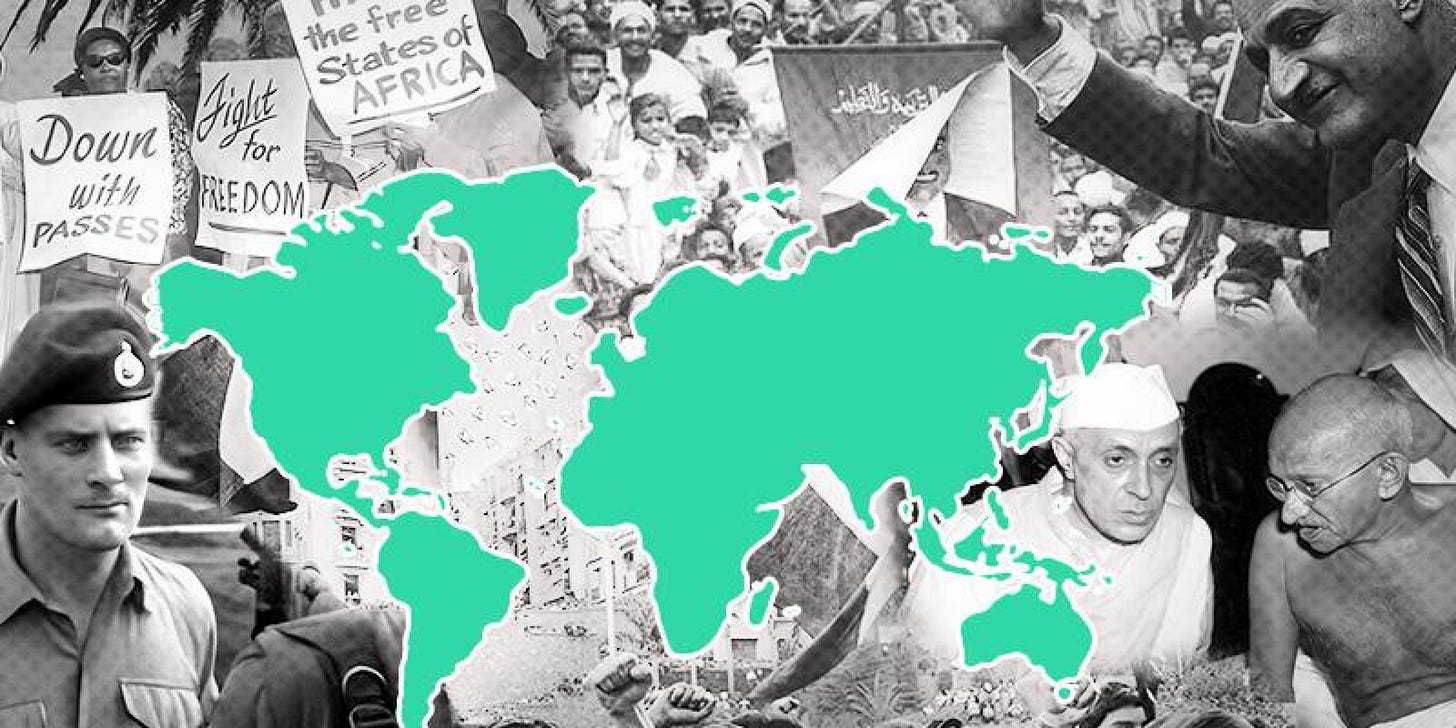ISRF Newsletter – April 2025
This April we begin a new three-part lecture series on colonialism and decolonisation. Also in this newsletter: a Director's Note, upcoming ISRF events, Fellows news, and our latest blog posts.
Contents
Director’s Note
Decolonization of Economic Policy
Christopher Newfield
The ISRF has been partnering with Gresham College to run an annual lecture series in London. Last year, our topic was Migration, which was also one of three themes at our 2024 Conference in Warsaw. This month, we’re starting a new series on Decolonisation. ISRF Fellows Martin Thomas, Julia Laite and Adam Hanieh will be speaking over the next few weeks. You can find the details here.
If you haven’t visited Gresham’s Barnard’s Inn Hall in Holborn near the Chancery Lane tube stop, do consider coming. It’s one of England’s unique educational places—a free adult education college founded during the reign of Queen Elizabeth I.
We’ve also just started the fourth set in our series of seminars on political economy. This one is called “Redesigning Finance for Climate Justice” and is oriented around a research project led by Daniela Gabor, who recently moved to SOAS, University of London. Our first meeting discussed a paper titled “Financing Technological Innovation in China”, a surprising, illuminating piece of research by Cornel Ban (Copenhagen Business School) and Xuan Li (Zhejiang University of Technology). The paper analyses the innovation system that has allowed China not merely to play catch-up with the West but, in many domains, particularly green tech, to leapfrog it. The paper also made me think about decolonisation as an economic as well as a political process…
Documentary Screening: Like Lockdown Never Happened, by Joy White
Thursday 3 April 2025, 6:30pm-9:30pm (BST). In person.
BLOC, Queen Mary University of London
With a focus on contemporary Black music, this book takes a deep dive into a few of the various forms that popular culture took over this period, including Kano’s Newham Talks series; Steve McQueen’s BBC anthology Small Axe; the Verzuz DJ Battle series; TikTok’s Don’t Rush Challenge. The documentary reflects on some of the key themes in the book.
Decolonization Lectures, part 1: A World Remade by Decolonization?
Wednesday 9 April, 2025, 6:00pm (BST). In person and online.
Barnard’s Inn Hall, London
Professor Martin Thomas's lecture shares perspectives from global history, comparative politics, and international relations to revaluate whether the twentieth-century collapse of European colonialism was as definitive as often portrayed. It suggests that, while in some ways, ending European Empires remade our contemporary world, in others processes of decolonization are far from complete.
Decolonization Lectures, part 2: Shanawdithit: A Woman at the End of the World
Wednesday 30 April, 2025, 6:00pm (BST). In person and online.
Barnard’s Inn Hall, London
Professor Julia Laite's lecture seeks to narrate the history of Shanawdithit's fascinating and important life, alongside the history of her island, which was England's first transatlantic colony.
Decolonization Lectures, part 3: Oil, Decolonisation, and the Future of the Climate Emergency
Thursday 15 May, 2025, 6:00pm (BST). In person and online.
Barnard’s Inn Hall, London
Professor Adam Hanieh's lecture explores oil's influence on national independence struggles, from the 1955 Bandung Conference to the rise of OPEC and the nationalisation of crude reserves.
What’s My Social Media Telling Me?
Dale Mineshima-Lowe
In this contribution to Bulletin 32, Dale Mineshima-Lowe looks at data on social media use in Myanmar to explore whether social media can facilitate climate change information and resilience.
Israel’s war on Gaza is deliberately targeting children – new UN report
Rachel Rosen and Mai Abu Moghli
A fresh round of Israeli airstrikes on Gaza which has killed more than 400 Palestinians has destroyed any hope that the ceasefire negotiated in January would hold.
Should They Stay or Should They Go (Back)?
Ana Budimir, Ružica Šimić Banović and Valentina Vučković
In this contribution to Bulletin 32, Ana Budimir, Ruzica Simic Banovic and Valentina Vuckovic explore the diverse ways Eastern European governments are using policy tools to engage with their diasporic communities.
Three Memorable Ways the COVID Pandemic Shaped Black Music – Five Years On
Joy White
Allowed outside for a mere one hour per day, for many of us, Black musical forms offered a way to pass the time. In a period of social isolation, it also connected us with each other.
The Unvirtuous Circle: What Happens when Radical Right Populists Control Immigration Policy?
Sean Kippin
In this contribution to Bulletin 32, Sean Kippin explores the record of different far-right political parties on immigration policy, arguing that their policy failure feeds into further populist rhetoric on migration.
Video: Book Launch for Kristina Kolbe, The Sound of Difference: Race, Class and the Politics of ‘Diversity’ in Classical Music
On the 20th of March, the ISRF hosted a book launch to celebrate the publication of Kristina Kolbe’s brilliant new book, The Sound of Difference: Race, Class and the Politics of ‘Diversity’ in Classical Music. We were joined by Anna Bull, Billy Holzberg, and Anamik Saha.
Video: Book Launch for Jay Wiggan, The Politics of Unemployment Policy in Britain: Class Struggle, Labour Market Restructuring and Welfare Reform
On the 7th of March, the ISRF hosted a book launch to celebrate the publication of Jay Wiggan’s important new study, The Politics of Unemployment Policy in Britain: Class Struggle, Labour Market Restructuring and Welfare Reform. We were joined by Chris Grover and Anne Daguerre.
New Publication: Spaces of Anticolonialism: Delhi's Urban Governmentalities (University of Georgia Press)
In Spaces of Anticolonialism: Delhi's Urban Governmentalities, Professor Stephen Legg provides a spatial analysis of the anticolonial governmentalities that emerged in the colonial capital of British India.
11th Independent Scholar Fellow Competition (ISF11)
Launching late summer 2025
Independent scholars not employed at a university or research institution can apply for a one-year fellowship to complete a significant piece of new research.
12th Flexible Grants for Small Groups Competition (FG12)
Launching autumn 2025
Funding support for small groups (2-10 scholars) to complete a piece of research or undertake face-to-face joint group work.
11th Flexible Grants for Small Groups Competition (FG11)
Application window closed on 10th January 2025
Funding support for small groups (2-10 scholars) to complete a piece of research or undertake face-to-face joint group work.
8th Early Career Fellowship competition (ECF8)
Application window closed on 14th February 2025
Individual scholars and pairs are eligible to apply for a one-year fellowship to complete a significant piece of new research.







